The global general intelligent decision-making service market is forecast to grow from USD 1,181.3 million in 2025 to USD 3,768.3 million by 2035, reflecting a robust CAGR of 12.3%. Over this decade, the market is expected to add USD 2,587.0 million in absolute terms, driven by the accelerated adoption of artificial intelligence (AI) and machine learning-based decision-making platforms.
The growth is largely fueled by industries seeking automation in complex decision processes, expansion in big data analytics, and increasing integration of AI services in sectors such as finance, healthcare, manufacturing, and logistics. Regulatory frameworks encouraging AI adoption and cloud-based service deployment will also strengthen demand, while concerns over data security and integration costs may act as restraints in certain years.
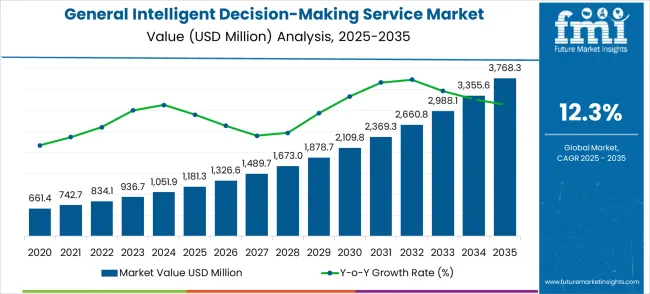
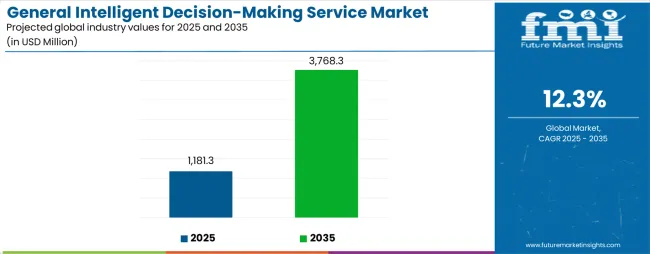
From 2025 to 2028, the market grows from USD 1,181.3 million to USD 1,673.0 million, adding USD 491.7 million. This phase sees steady YoY growth ranging from 12.3% to 13.3%, supported by gradual deployment in early adopters, particularly in financial services and enterprise analytics. In 2026, the market rises by USD 163.1 million, representing a strong year-on-year increase of 12.3%, driven by the adoption of AI-enabled decision-making in operational optimization. These early years focus on establishing infrastructure and proof-of-concept projects, enabling confidence for larger-scale rollouts later.
Between 2029 and 2032, growth accelerates significantly, with market value rising from USD 1,878.7 million to USD 2,988.1 million, an increase of USD 1,109.4 million, representing approximately 42.9% of the decade’s total growth. Annual increments exceeded USD 200 million in this period, with the largest single-year growth of USD 328.9 million occurring in 2031. This surge corresponds with broader industry adoption across mid-tier and large enterprises, supported by advancements in AI algorithms, enhanced data processing capabilities, and government incentives for AI-based digital transformation.
| General Intelligent Decision-Making Service Market | Value |
|---|---|
| Market Value (2025) | USD 1,181.3 million |
| Market Forecast Value (2035) | USD 3,768.3 million |
| Market Forecast CAGR | 12.3% |
From 2033 to 2035, the market continues its strong trajectory, adding USD 780.2 million and reaching USD 3,768.3 million. YoY increments moderate slightly to around USD 200–250 million, reflecting a maturing market where adoption rates stabilize but total market value is significantly higher. By this stage, intelligent decision-making services are embedded across industry verticals, with focus on real-time analytics, predictive modeling, and decision automation. Growth drivers include expansion of edge computing, AI democratization, and demand for adaptive systems, while restraints such as evolving regulatory compliance and integration complexity persist but at lower impact levels. This decade-long progression highlights a robust, sustained upward dynamic for the market.
Market expansion is being supported by the rapid increase in digital transformation initiatives worldwide and the corresponding need for intelligent decision-making services that provide superior analytical performance and operational reliability. Modern enterprises rely on comprehensive data analysis and decision accuracy to ensure optimal business outcomes including risk management, process optimization, and strategic planning applications. Even minor decision-making errors can require comprehensive operational adjustments to maintain optimal business standards and competitive effectiveness.
The growing complexity of business decision requirements and increasing demand for real-time analytical capabilities are driving demand for intelligent decision-making service solutions from certified providers with appropriate AI capabilities and technical expertise. Enterprises are increasingly requiring documented analytical accuracy and system reliability to maintain business quality and operational effectiveness. Industry specifications and performance standards are establishing standardized decision-making procedures that require specialized AI technologies and trained analytical systems.
The general intelligent decision-making service market is entering a transformative growth phase driven by increasing AI adoption initiatives, rising demand for automated business processes, and technological advancement. As enterprises across both developed and emerging markets seek services that deliver superior accuracy, operational reliability, and comprehensive analytical capabilities, decision-making systems are evolving from basic data analysis tools to sophisticated AI solutions integrated with machine learning, predictive analytics, and advanced cognitive computing technologies.
Rising digitalization and AI adoption in Asia-Pacific, Latin America, and Middle East & Africa amplify demand, while service providers are advancing innovations in natural language processing, predictive modeling, and automation integration improvements. Pathways like cognitive AI integration, multi-domain capabilities, and cloud-enabled systems promise strong margin uplift, especially in mature markets. Geographic expansion and localization will capture volume growth, particularly where AI infrastructure is developing or modernization programs are underway. Regulatory frameworks around AI governance, decision transparency requirements, and ethical AI implementation provide structural market support.
The market is segmented by service type, application, and region. By service type, the market is divided into Decision-Making Support Service, Automatic Decision-Making Service, and others. Based on application, the market is categorized into financial industry, manufacturing industry, medical industry, and others. Regionally, the market is divided into North America, Europe, East Asia, South Asia & Pacific, Latin America, and Middle East & Africa.
In 2025, the Decision-Making Support Service segment is projected to capture around 56% of the total market share, making it the leading service category. This dominance is largely driven by the widespread adoption of proven decision support technologies that deliver reliable analytical assistance with excellent accuracy across various business applications. The Decision-Making Support Service is particularly favored for its ability to provide consistent performance in both strategic planning and operational decision scenarios, ensuring analytical flexibility for enterprises. Financial institutions, consulting firms, healthcare organizations, and manufacturing companies increasingly prefer this service type, as it meets daily analytical needs without imposing excessive operational complexity or extensive system integration requirements. The availability of well-established service platforms, along with comprehensive analytical tools and technical support from leading providers, further reinforces the segment's market position. This service category benefits from consistent demand across regions, as it is considered a reliable standard solution for organizations with varying decision-making requirements.
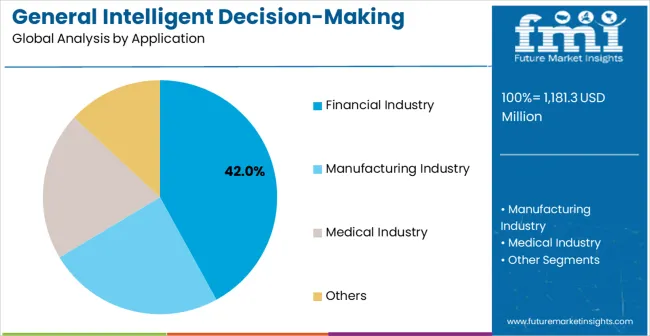
The financial industry segment is expected to represent 42% of general intelligent decision-making service demand in 2025, highlighting its position as the most significant application sector. This dominance stems from the unique operational needs of financial services applications, where comprehensive risk analysis and reliable decision accuracy are critical to effective financial management and regulatory compliance. Financial industry applications often feature complex analytical requirements that demand continuous decision support throughout extended business operations, requiring dependable and precise AI-powered systems. Intelligent decision-making services are particularly well-suited to these applications due to their ability to deliver comprehensive analytical insights quickly and effectively, even during periods of high-volume transaction processing and market volatility. As financial institutions expand globally and emphasize improved risk management capabilities, the demand for advanced decision-making services continues to rise. The segment also benefits from heightened focus on regulatory compliance initiatives, where financial organizations are increasingly prioritizing accurate risk assessment and consistent decision quality as key components of comprehensive financial management programs. With financial companies investing in digital transformation and operational optimization, intelligent decision-making services provide an essential solution to maintain high-performance analytical capabilities.
The market is advancing rapidly due to increasing AI adoption initiatives and growing recognition of intelligent automation advantages over traditional decision-making methods. The market faces challenges including higher initial implementation costs compared to conventional analytical systems, need for specialized AI expertise for optimal deployment, and varying data privacy requirements across different jurisdictions. Technology advancement efforts and AI optimization programs continue to influence service development and market adoption patterns.
The growing development of advanced cognitive computing systems is enabling higher decision accuracy with improved pattern recognition and reduced analytical bias characteristics. Enhanced cognitive processing technologies and optimized AI algorithms provide superior decision-making performance while maintaining compliance with business requirements. These technologies are particularly valuable for enterprises who require reliable AI performance that can support complex decision scenarios with consistent accuracy and operational reliability.
Modern decision-making service providers are incorporating advanced multi-modal AI features and automation improvements that enhance business efficiency and service effectiveness. Integration of advanced natural language processing systems and optimized data integration enables superior analytical results and comprehensive decision support capabilities. Advanced service features support operation in diverse business environments while meeting various analytical requirements and operational specifications, including financial services, healthcare applications, and manufacturing optimization.
The continuous development of enhanced edge computing technologies and distributed processing systems is extending analytical capabilities while maintaining consistent service performance throughout extended business operations. Advanced edge processing features and intelligent data management provide comprehensive analytical capabilities that support extensive business activities without performance degradation. These edge computing innovations are particularly valuable for organizations requiring real-time decision support where service reliability and consistent performance are essential for effective business outcomes and competitive advantage.
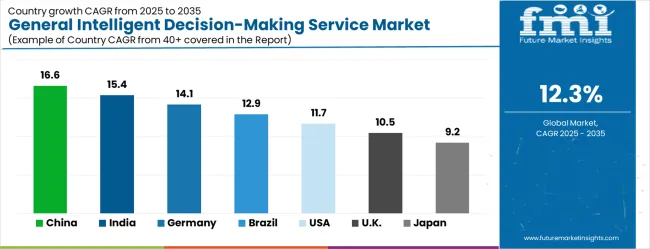
| Country | CAGR (2025-2035) |
|---|---|
| China | 16.6% |
| India | 15.4% |
| Germany | 14.1% |
| Brazil | 12.9% |
| United States | 11.7% |
| United Kingdom | 10.5% |
| Japan | 9.2% |
The market is growing rapidly, with China leading at a 16.6% CAGR through 2035, driven by strong AI development initiatives and increasing adoption of intelligent automation technologies. India follows at 15.4%, supported by rising technology infrastructure development and growing awareness of AI-powered business solutions. Germany grows steadily at 14.1%, integrating advanced AI technology into its established enterprise infrastructure. Brazil records 12.9%, prioritizing digital transformation and AI adoption initiatives. The United States shows solid growth at 11.7%, focusing on AI innovation leadership and enterprise integration. The United Kingdom demonstrates steady progress at 10.5%, maintaining established AI applications. Japan records 9.2% growth, concentrating on AI precision enhancement and technological optimization.
The report covers an in-depth analysis of 40+ countries; top-performing countries are highlighted below.
China is projected to exhibit the highest growth rate with a CAGR of 16.6% through 2035, driven by rapid expansion of AI infrastructure and increasing demand for intelligent automation technologies. The country's growing focus on digital economy development and expanding AI research initiatives are creating significant demand for comprehensive decision-making solutions. Major service providers are establishing comprehensive technology platforms to support the increasing requirements of enterprises and government organizations across financial services and manufacturing applications. Government AI development initiatives are supporting establishment of intelligent decision-making capabilities and advanced analytical systems, driving demand for sophisticated AI technology throughout major business centers and technology hubs. Digital transformation programs are facilitating adoption of intelligent automation technology that enhances business effectiveness and decision accuracy standards across enterprise networks. The Chinese government's commitment to advancing AI leadership and improving business competitiveness is accelerating investments in advanced decision-making services. National technology development projects and smart city initiatives are incorporating intelligent decision systems that require sophisticated AI capabilities. Enterprise digitalization and financial technology expansion programs are creating additional demand for professional-grade decision-making services that meet international accuracy standards and reliability requirements.
India is expanding at a CAGR of 15.4%, supported by increasing technology infrastructure development and growing awareness of AI-powered business benefits. The country's expanding IT sector and rising digital transformation standards are driving demand for professional-grade decision-making solutions. Technology companies and financial institutions are gradually implementing advanced AI services to maintain competitive standards and operational effectiveness. Technology sector growth and infrastructure development are creating opportunities for service providers that can support diverse business requirements and performance specifications. Professional training and development programs are building technical expertise among business professionals, enabling effective utilization of AI technology that meets enterprise standards and analytical accuracy requirements across metropolitan regions. India's rapid digitalization and increasing fintech development are intensifying the need for effective decision support capabilities and automated business systems. National digital initiatives and technology infrastructure projects are establishing comprehensive AI systems that require advanced decision-making services. Government initiatives focusing on digital India programs and technology advancement are driving adoption of modern AI technology for enterprises. The growing focus on professional AI training and technology standardization is supporting adoption of internationally certified decision-making systems.
Germany is projected to grow at a CAGR of 14.1%, supported by the country's focus on business quality standards and advanced AI technology adoption. German enterprises are implementing sophisticated AI systems that meet stringent accuracy requirements and operational specifications. The market is characterized by focus on service precision, analytical reliability, and compliance with comprehensive business quality standards. Industry investments are prioritizing advanced AI technology that demonstrates superior decision-making performance and reliability while meeting German quality and operational standards. Professional certification programs are ensuring comprehensive technical expertise among business professionals, enabling specialized AI capabilities that support diverse enterprise applications and operational requirements across business networks. Germany's commitment to maintaining the highest business standards in Europe drives continuous investment in cutting-edge AI technology. The country's comprehensive enterprise infrastructure requires sophisticated AI services that meet strict accuracy and reliability standards. Integration with Industry 4.0 systems and digital business networks is creating demand for advanced AI technology with enhanced connectivity capabilities. Enterprises are modernizing their decision-making capabilities through adoption of state-of-the-art AI services that support both traditional business operations and automated decision processes.
Brazil is growing at a CAGR of 12.9%, driven by increasing digital transformation initiatives and growing recognition of intelligent automation advantages. The country's expanding technology infrastructure is gradually integrating professional-grade AI services to enhance business capabilities and operational effectiveness. Enterprises and financial institutions are investing in AI technology to address evolving digital requirements and competitive standards. Digital transformation is facilitating adoption of advanced AI technologies that support comprehensive decision-making capabilities across business and financial sectors. Professional development programs are enhancing technical capabilities among business personnel, enabling effective AI service utilization that meets evolving enterprise standards and operational requirements throughout business networks. Brazil's growing technology sector and expanding financial services infrastructure are driving demand for sophisticated AI solutions. Federal and state government initiatives focused on advancing digital capabilities and improving business competitiveness are supporting adoption of modern AI technology. Enterprise expansion and increasing technology applications in major metropolitan areas require enhanced decision-making capabilities that can support effective business operations. The expansion of professional technology services and specialized AI centers is creating constant demand for reliable, accurate intelligent decision-making systems.
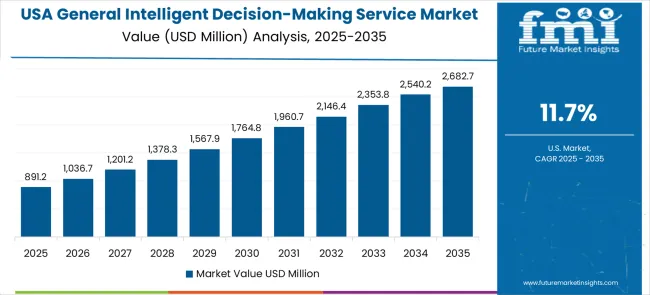
The U.S. is expanding at a CAGR of 11.7%, driven by established technology companies and growing focus on AI innovation enhancement. Large enterprises and financial institutions are implementing comprehensive AI capabilities to serve diverse business requirements. The market benefits from established service ecosystems and professional development programs that support various enterprise applications. Technology industry leadership is enabling standardized AI utilization across multiple business types, providing consistent analytical accuracy and comprehensive decision support coverage throughout regional markets. Professional development and certification programs are building specialized technical expertise among business professionals, enabling effective AI service utilization that supports evolving enterprise requirements across metropolitan areas. The U.S. market is characterized by continuous AI advancement and integration with modern enterprise and financial systems. Federal research funding programs and technology initiatives are driving development of sophisticated AI systems that meet stringent accuracy and reliability standards. Technology companies and financial institutions are modernizing their decision-making capabilities through adoption of advanced AI technology. The focus on innovation leadership and competitive advantage is supporting demand for cutting-edge, high-performance AI services that enhance business capabilities while maintaining analytical accuracy.
The U.K. is projected to grow at a CAGR of 10.5%, supported by established business sectors and growing focus on AI capabilities. British enterprises and financial institutions are implementing AI systems that meet industry accuracy standards and operational requirements. The market benefits from established technology infrastructure and comprehensive training programs for business professionals. Business investments are prioritizing advanced AI services that support diverse applications while maintaining established accuracy and operational standards. Professional development programs are building technical expertise among business personnel, enabling specialized AI operation capabilities that meet evolving business requirements and accuracy standards throughout regional enterprise networks. The United Kingdom's comprehensive digital strategy and commitment to maintaining business innovation leadership drives continued investment in advanced AI technology. Enterprises across England, Wales, Scotland, and Northern Ireland are standardizing their AI services to ensure consistent decision-making capabilities. Integration with digital business systems and coordination with financial technology programs requires sophisticated AI services. The focus on professional business training and service certification is supporting adoption of high-quality AI systems that meet regulatory standards and operational requirements.
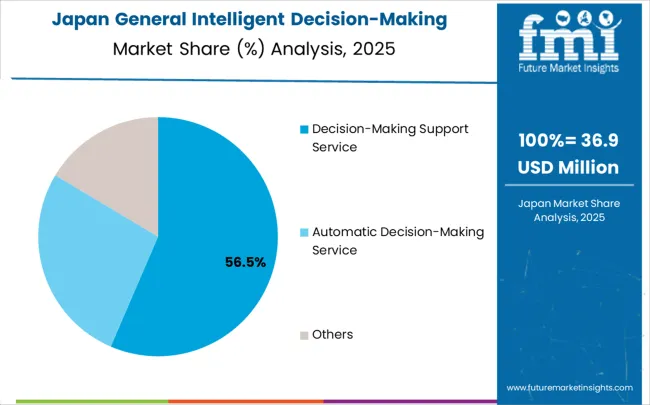
Japan is growing at a CAGR of 9.2%, driven by the country's focus on AI precision innovation and business excellence applications. Japanese enterprises are implementing advanced AI systems that demonstrate superior accuracy reliability and operational efficiency. The market is characterized by focus on technological precision, quality assurance, and integration with established business workflows. Technology industry investments are prioritizing innovative AI solutions that combine advanced decision-making technology with precision engineering while maintaining Japanese quality and reliability standards. Professional development programs are ensuring comprehensive technical expertise among business professionals, enabling specialized AI capabilities that support diverse enterprise applications and operational requirements throughout business networks. Japan's commitment to maintaining the highest standards of technological precision and business quality drives continuous advancement in AI technology. The integration of AI systems with robotic process automation and intelligent business networks requires sophisticated service capabilities. Enterprises across Japan's business regions are modernizing their decision-making services through adoption of cutting-edge AI technology that meets strict performance and reliability standards. The focus on precision engineering and technological advancement is supporting development of next-generation AI systems with enhanced accuracy and operational capabilities.
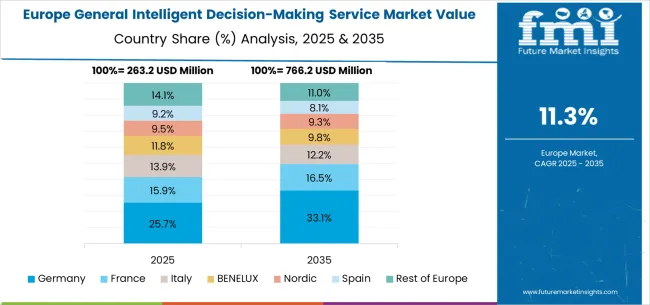
The general intelligent decision-making service market in Europe is anticipated to expand from USD 337.2 million in 2025 to approximately USD 1,075.4 million by 2035, reflecting a CAGR of 12.3% during the forecast period. Germany is set to reinforce its leading position, commanding a 28.9% share of the European market in 2025, supported by its established enterprise infrastructure, high standards for analytical accuracy, and continuous investment in advanced AI technologies. The United Kingdom follows with a market share of 19.7%, benefiting from standardized business procedures, professional development programs, and a robust focus on AI innovation. France is projected to capture 17.3% of the regional market, fueled by steady integration of modern AI services and enhancements in business operations. Italy and Spain together represent 18.4% of total demand, as both countries advance their digital transformation efforts and invest in professional-grade AI solutions for enterprises. The Rest of Europe, comprising Nordic countries, BENELUX, and Eastern European markets, accounts for 15.7%, driven by regulatory convergence, infrastructure upgrading, and broader adoption of advanced AI technology to support evolving business requirements and digital transformation programs.
The market is defined by competition among specialized AI service providers, technology companies, and enterprise solution developers. Companies are investing in advanced AI technology development, decision accuracy optimization, automation improvements, and comprehensive integration capabilities to deliver reliable, intelligent, and cost-effective decision-making solutions. Strategic partnerships, technological innovation, and market expansion are central to strengthening service portfolios and market presence.
IBM offers comprehensive AI-powered decision-making solutions with established technology expertise and enterprise-grade analytical capabilities. Salesforce provides specialized customer decision intelligence platforms with focus on CRM integration and operational efficiency. Palantir Technologies delivers advanced data analytics solutions with focus on complex decision support and government applications. SAS Institute specializes in statistical analysis services with advanced decision modeling capabilities.
Microsoft offers cloud-based AI services with comprehensive business intelligence support capabilities. Google delivers machine learning platforms with advanced AI technologies. Amazon provides cloud AI services with focus on scalability and integration. Oracle offers enterprise decision systems, while DataRobot delivers automated machine learning solutions. 4Paradigm and Polixir provide specialized AI expertise, service reliability, and product development across global and regional market segments.
| Item | Value |
|---|---|
| Quantitative Units | USD 1,181.3 million |
| Service Type | Decision-Making Support Service, Automatic Decision-Making Service |
| Application | Financial Industry, Manufacturing Industry, Medical Industry |
| Regions Covered | North America, Europe, East Asia, South Asia & Pacific, Latin America, Middle East & Africa |
| Country Covered | China, India, Germany, Brazil, United States, United Kingdom, Japan, and 40+ countries |
| Key Companies Profiled | IBM, Salesforce, Palantir Technologies, SAS Institute, Microsoft, Google, Amazon, Oracle, DataRobot, 4Paradigm, Polixir |
| Additional Attributes | Dollar revenue by service type and application segment, regional demand trends across major markets, competitive landscape with established AI service providers and emerging technology companies, customer preferences for different AI technologies and decision support options, integration with enterprise systems and business workflows, innovations in cognitive computing and machine learning technologies, and adoption of automation features with enhanced accuracy capabilities for improved business decision workflows. |
The global general intelligent decision-making service market is estimated to be valued at USD 1,181.3 million in 2025.
The market size for the general intelligent decision-making service market is projected to reach USD 3,768.3 million by 2035.
The general intelligent decision-making service market is expected to grow at a 12.3% CAGR between 2025 and 2035.
The key product types in general intelligent decision-making service market are decision-making support service, automatic decision-making service and others.
In terms of application, financial industry segment to command 42.0% share in the general intelligent decision-making service market in 2025.






Our Research Products

The "Full Research Suite" delivers actionable market intel, deep dives on markets or technologies, so clients act faster, cut risk, and unlock growth.

The Leaderboard benchmarks and ranks top vendors, classifying them as Established Leaders, Leading Challengers, or Disruptors & Challengers.

Locates where complements amplify value and substitutes erode it, forecasting net impact by horizon

We deliver granular, decision-grade intel: market sizing, 5-year forecasts, pricing, adoption, usage, revenue, and operational KPIs—plus competitor tracking, regulation, and value chains—across 60 countries broadly.

Spot the shifts before they hit your P&L. We track inflection points, adoption curves, pricing moves, and ecosystem plays to show where demand is heading, why it is changing, and what to do next across high-growth markets and disruptive tech

Real-time reads of user behavior. We track shifting priorities, perceptions of today’s and next-gen services, and provider experience, then pace how fast tech moves from trial to adoption, blending buyer, consumer, and channel inputs with social signals (#WhySwitch, #UX).

Partner with our analyst team to build a custom report designed around your business priorities. From analysing market trends to assessing competitors or crafting bespoke datasets, we tailor insights to your needs.
Supplier Intelligence
Discovery & Profiling
Capacity & Footprint
Performance & Risk
Compliance & Governance
Commercial Readiness
Who Supplies Whom
Scorecards & Shortlists
Playbooks & Docs
Category Intelligence
Definition & Scope
Demand & Use Cases
Cost Drivers
Market Structure
Supply Chain Map
Trade & Policy
Operating Norms
Deliverables
Buyer Intelligence
Account Basics
Spend & Scope
Procurement Model
Vendor Requirements
Terms & Policies
Entry Strategy
Pain Points & Triggers
Outputs
Pricing Analysis
Benchmarks
Trends
Should-Cost
Indexation
Landed Cost
Commercial Terms
Deliverables
Brand Analysis
Positioning & Value Prop
Share & Presence
Customer Evidence
Go-to-Market
Digital & Reputation
Compliance & Trust
KPIs & Gaps
Outputs
Full Research Suite comprises of:
Market outlook & trends analysis
Interviews & case studies
Strategic recommendations
Vendor profiles & capabilities analysis
5-year forecasts
8 regions and 60+ country-level data splits
Market segment data splits
12 months of continuous data updates
DELIVERED AS:
PDF EXCEL ONLINE
General Purpose DC Contactor Market Size and Share Forecast Outlook 2025 to 2035
General Surgery Devices Market Insights – Demand and Growth Forecast 2025 to 2035
Generalized Anxiety Disorder Treatment Market Insights by Drug Class, Therapies, Distribution Channel, and Region 2035
General Purpose Electronic Test and Measurement Instruments Market Analysis and Forecast by Product, End Use, and Region Through 2035
Generalized Myasthenia Gravis Management Market - Growth & Treatment Advances 2025 to 2035
General Anesthesia Drugs Market Insights – Trends & Forecast 2025 to 2035
General Equipment Rental Services Market Size and Share Forecast Outlook 2025 to 2035
Intelligent Road Test Instruments Market Size and Share Forecast Outlook 2025 to 2035
Intelligent Driving Technology Solution Market Size and Share Forecast Outlook 2025 to 2035
Intelligent Completion Market Size and Share Market Forecast and Outlook 2025 to 2035
Intelligent Rubber Tracks Market Size and Share Forecast Outlook 2025 to 2035
Intelligent Cervical Massager Market Size and Share Forecast Outlook 2025 to 2035
Intelligent Garment Hanging Conveyor System Market Size and Share Forecast Outlook 2025 to 2035
Intelligent Rotary Kiln Monitoring Systems Market Size and Share Forecast Outlook 2025 to 2035
Intelligent Multifunctional Laser Bird Repeller Market Size and Share Forecast Outlook 2025 to 2035
Intelligent Platform Management Interface (IPMI) Market Size and Share Forecast Outlook 2025 to 2035
Intelligent Flow Meter Market Size and Share Forecast Outlook 2025 to 2035
Intelligent Lighting Control Market Size and Share Forecast Outlook 2025 to 2035
Intelligent Enterprise Data Capture Software Industry Analysis in Japan Size and Share Forecast Outlook 2025 to 2035
Intelligent Vending Machine Market Insights – Demand, Size & Industry Trends 2025–2035

Thank you!
You will receive an email from our Business Development Manager. Please be sure to check your SPAM/JUNK folder too.
Chat With
MaRIA